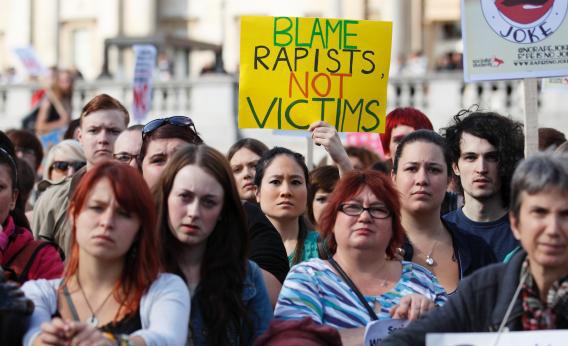Like Amanda Marcotte, I was also captivated by Gina Tron’s account of how the criminal justice system left her behind when she was targeted by a Brooklyn, N.Y., serial rapist in 2010. But it wasn’t just the law that let her down. I was struck, but not surprised, by how even well-meaning family and friends failed to support her in the aftermath of the assault. Her piece is titled “I Got Raped, Then My Problems Started,” which is the clearest articulation I’ve read of how our casual societal attitudes about sexual assault can work to compound the trauma of victims, inside and outside the courtroom.
She writes:
… I had to deal with the ramifications of my rape that didn’t have anything to do with the cops or the courts. I initially only told a few people I trusted about what happened—I wanted to keep the situation on the down-low, since I was worried people would react in all kinds of ways that would make me uncomfortable. Well, that didn’t work out. Within a few days 60 or 70 people knew, and nobody wanted to hang out with me, out of fear that as a “rape victim” I’d burst into tears unpredictably or whatever. One of my best friends at the time told me she couldn’t be my friend anymore and wouldn’t even listen to me when I told her details about the assault. She said it was too heavy to hear, and claimed that what happened to me had given her post-traumatic stress disorder.
A few family members told me that they were grieving over me, because rape is a “fate worse than death.” Another told me that they were not shocked this happened to me because I was a victim by nature. “Some people are victims and some are predators,” they said. “You are a victim.” Some people actually seemed straight-up jealous because apparently I now had a “valid reason” to be depressed. These were acquaintances who were generally unhappy and they probably felt insecure that they only had minor relationship hassles and shitty bosses to blame their ennui on.
Reading the piece, I thought of a friend who told me that when he has children, he hopes they won’t be girls. His boys, he says, would benefit from a progressive upbringing that teaches them not to victimize women. But his girls would be impossible to protect from other people’s kids. Apparently, the thought of daughters who might be violated scares him so much that he’d prefer they didn’t exist.
That’s an extreme view, but I’ve watched a similar attitude play out in our wider cultural response to sexual assault. Sometimes we focus so much of our attention on preventing rapes from happening that we end up ignoring our own responsibility to victims when they do occur. People may think they are protecting women when they instruct them not to get too drunk, fall in with strangers, or walk home alone at night, lest they become vulnerable to sexual assault. But those “tips” don’t just fail to prevent rapes—they end up piling more shame onto women when they are assaulted, ripping out their support system and contributing to their injury. A similar thing happens when friends and family insist that rape is so inherently damaging—“a fate worse than death”—that a victim can never fully recover from it. What these people fail to recognize is that their own support is crucial to a victim getting her life back. By branding sexual assault as an unspeakable crime, they rob the victim of the ability to talk openly about her own experiences, even with those closest to her.
When my friend has children, he may be unable to totally shelter them from harm, but he can be a positive force in their lives if and when bad things happen to them. As Tron’s story shows, addressing America’s problem with sexual assault won’t just require us to hunt down and prosecute rapists—it will require us to take a hard look at our own reactions, too.
